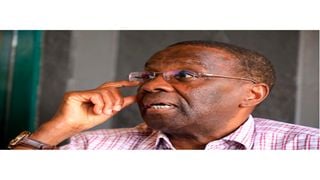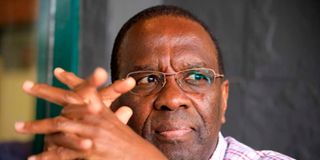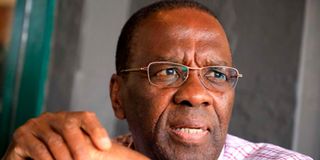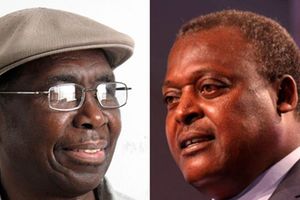
Former Chief Justice Willy Mutunga during an interview with the Sunday Nation in Nairobi on October 22, 2021.
| Jeff Angote | Nation Media GroupNews
Premium
Willy Mutunga: Why Martha Koome should be a politician, not a lawyer
It has been five years since you retired as Chief Justice. How is life in retirement and what do you do to keep yourself busy?
I always tell people that I am retired but not tired. Shortly after I retired I was sent to the Maldives by the Secretary General of the Commonwealth to mediate between then ruling party and the opposition ahead of elections scheduled for 2018.
The main opposition leader then, former President Mohamed Nasheed, was outside the country in exile. I visited the Maldives and talked to them but realised that it was going to be difficult because you cannot mediate between people who are not interested. The government then quit the Commonwealth and that was the end of my mandate.
I then went to New York, to Fordham University School of Law’s Leitner Centre, for almost seven months. In the meantime I was writing my memoirs and writing another book on transformative constitutions. New York was a nice place to do that.
Otherwise it has been mostly reading and writing, spending a lot of time with youth groups and social justice centres. And then we got involved in Kongamano La Mageuzi, which we have since renamed Kongamano La Mapinduzi. And recently I was asked to convene the National Alternative Leadership Convention for political parties that are not part of the three factions: ODM, Jubilee/UDA and One Kenya Alliance. That is where you have Ukweli Party, Neto Agostinho’s United Green Movement and the Communist Party of Kenya, which is chaired by Mwandawiro Mghanga and has the fiery Booker Omole on board.
The reason I have been involved in all of these initiatives is that a lot of the things that are happening now also happened in the 1980s. Although we have a progressive constitution, the past is indeed the present and the future.
For example, if you look at the case of Miguna Miguna, which is the issue that I recently wrote about, you have a State that destroys your house, drugs you so that you can get out of the country, and you have orders from the courts saying that you will only be allowed to come in using the national ID card or your torn passport. The Miguna case is a great example of violations, nationally and internationally, that have to be resisted. I hear some people say Miguna is difficult and all other manner of things, but that is rationalising evil. Even if Miguna was a bad person, which I don’t think he is, he is just fighting for his rights.
To some people you left the Office of the Chief Justice and went back to your roots in activism. Is this correct? Did you ever leave your activism even when you were the Chief Justice?
I never left activism. If I did then why did President Uhuru Kenyatta and National Assembly Speaker Justin Muturi call me an activist Chief Justice? Remember we are all activists. It only depends on the causes we are activists in. The Constitution itself is activist and judges are activists. What I am doing is what I was doing in the 1970s: fighting against impunity and denial of rights. It pained me then and it pains me now to see what is happening to Miguna Miguna, or Boniface Mwangi’s house being blown up. Since we work with social justice centres, we get information on young people being killed in the informal settlements on a daily basis. If those things don’t pain Kenyans then I don’t know what will.
The Judiciary has been accused of leading an agenda against the government, and the judges mostly doing that were appointed during your time as Chief Justice. What are your views on this?
I read the piece by Paul Mwangi. I didn’t want to glorify that attack with a response. It is false and Mwangi knows it. He is accusing me of a Judiciary that subverts the government. The idea of saying that I am the one who created these so-called activist judges and so forth is to basically see them as robots. If he is a sycophant, he should not expect other people to be sycophants.
As a Judiciary, we used to meet at the Judiciary Training Institute. We would go there to be trained even on issues of elections. People forget that judges meet and study and develop jurisprudence within that institution.
These are intelligent people and for me to be accused of telling somebody as brilliant as George Odunga, or Joel Ngungi or Mumbi Ngugi or Aggrey Muchelule or Francis Tuiyott what to do is abusive and unfair. The problem I have with lawyers who become members of a very fanatical political organisation is that they tell these leaders what they want to hear.
But you have been accused of allowing, as Chief Justice, the likes of lawyer Ahmednasir Abdullahi to have unfettered powers. In fact some call it a cartel that intimidated judges to give decisions in a certain way.
I see these allegations. If you take the Grand Mullah (Ahmednasir) issue, for example, he is the one who brought down my competition as we were being interviewed. Ahmed was very aggressive when interviewing the others. If you remember that interview, in my case, nobody questioned my qualifications. They focused on my ear stud. They did not ask anything else. They asked others about corruption cases, I was asked how a CJ can wear a stud. People thought I got off very lightly without realising they could not challenge my qualifications. So, they focused on a small thing on my earlobe. I say the JSC that I chaired that had Ahmednasir, Emily Ominde and others was very independent and we worked as a team even after I became CJ, and when we were interviewing people it was a team effort.

Former Chief Justice Willy Mutunga during an interview with the Sunday Nation in Nairobi on October 22, 2021.
I have heard this thing about the Grand Mullah. Someone even wrote that Ahmednasir was the one who recruited me and I allowed him to run the Judiciary. When the CJ is making decisions, he or she has consulted widely and that is why it is very difficult for any CJ to be rogue, though you can. The JSC is very powerful. Any CJ knows the JSC can send you home.
Ahmednasir and I have been friends since he was the LSK president and a young lecturer in the university when he became dean. I have known him and he has been a friend because one thing I like about him, and I think it is something the Somalis as a community reflect, is that he does not backbite people. He comes to you very aggressively and tells you how it is and you won’t hear it from anyone else. That is my experience with Justice Warsame, Grand Mullah and Justice Ibrahim. It is a great community trait. Ahmednasir used to come to my office and say: “CJ! You have goofed!” and he is saying it loudly, and I would tell him to sit and we have a talk.
Was there a War Council as alleged? And if so, for what purpose was it created?
That came up when Gladys Boss Shollei had an issue which was in the public domain. Issues of corruption and such matters went to court and they ended there. The issue then, I think, was ethnicised. My Yahoo address was hacked. A lot of that stuff was created by the young IT people in the Judiciary. We had hired people to do the emails and help us with the technology.
The war council that was supposed to be against Shollei and so forth was just a figment of imagination for some people. If people remember, Shollei was suspended by the JSC when I was not there. They were in Mombasa and I summoned them and told them they could not suspend her without evidence. That is when they brought it. The people in the war council were not in the JSC.
One of the things that pains me is the false narrative that I did not work well with women judges, and a bit of it came up when I was summoned to a case where Justice Njoki Ndung’u was involved with the JSC. I put it on record that Njoki and I were good colleagues, we had no personal or professional issues. She got my support as CJ as I was summoned to go and testify. On my own volition, I would not have gone. But you do not get summoned by a court as a former CJ and fail to show up. You could be locked up for contempt to the court.
But it started with Nancy Baraza, that I threw her under the bus; then Rawal, then Shollei, and then Njoki. It has been very painful criticism, because it is not researched, it is not true. Nancy Baraza would be the first person to tell you that I was always in her corner. But when the matters go to the courts and the JSC and you cannot tell those hearing those matters that this is the decision to make.
We worked well with Rawal as my deputy. The thing people focused on was the retirement age because she was on the other side and we differed. But that is interpretation of the law, and it is allowed. Shollei is a very good administrator, we worked together. I was sad to see her go but it was not my decision. I am not the one who decided that she should be charged. How could I stop that?
When faced with evidence, I and other commissioners had to decide. I have known Njoki Ndung’u since she was a human rights activist and our relationship in court was collegial. People cannot create issues because we differed as judges. That is a hallmark of respect for each other. There is no CJ who will take a rungu and ask judges to rule in a particular way. That is how the JSC will remove you. Even a magistrate can report you and you will be gone.
The High Court on Thursday made it clear that its orders would no longer be ignored when it gave the President 14 days to appoint the six judges he left out from a recent list of appointees, failure to which they will be deemed to have been appointed. What is your take on this decision?
I am quite certain that the President swearing in judges is not a constitutional prerogative but a convention. If you remember the case of judge Warsame when the President refused to gazette his election to the Judicial Service Commission (JSC), the judges used the same words they have used in this instance: that he be deemed to be a JSC member and he has been serving. In this instant case the judges have used such past cases, in my view, to be very respectful of the President.
They are relying on the Constitution. It is not that they are violating the President’s prerogatives; they are basically saying that under the Constitution, you cannot say you have evidence that affects their suitability and you don’t give it after two years. They are also saying that these judges have rights. That is why they say that if the President does not swear them in within 14 days, we have given the Chief Justice the power to swear them in.

Former Chief Justice Willy Mutunga during an interview with the Sunday Nation in Nairobi on October 22, 2021.
This will be interesting because the courts now have to be clear about these traditions. If it goes to the Court of Appeal or the Supreme Court, they will be able to deal with those grey areas.
Personally, I think it is very important for the relations of the three arms to have these conventions as long as they are not abused. The Judiciary swears in commissioners of constitutional commissions and independent offices, the Inspector General of Police and all manner of appointments, so you can imagine if the Chief Justice says she is not going to swear in the IG.
Once, when Boinett was appointed as IG, we had that kind of conflict when then Interior Cabinet Secretary Joseph Nkaiserry wanted me to swear him in at the Office of President and I refused. I asked them to bring to him to the Judiciary because that is where we swore in the others. We had a discussion and they came to the chambers. He was very angry but that was how it should be.
I have no problem with the President being given that ceremonial role in the appointment of judges, but he still argues that he should not be given one name (for Chief Justice and Deputy Chief Justice). He wants three names. The President will tell you that he is not a rubberstamp, but the Constitution has made him a rubberstamp. The only thing he can do for the Chief Justice and the deputy, if he doesn’t like them to be confirmed, is use Parliament to reject them. But for the others, once JSC conducts the recruitment and settles on the names, there is nothing he can do.
It is unlikely the President will back down and implement this latest order though.
It is very likely they will take it to the Court of Appeal and then it goes to the Supreme Court. I have no issues with that because the law is going to be clarified. Politically, when you get out of the Constitution because this is a political issue, I think it will hurt him. May be he is not going to run again and therefore it doesn’t matter.
But you don’t want to lead a country where you look vindictive in little things like these and you completely disobey the law. It is not politically wise, in my view. You give people ammunition that they shouldn’t have. Of course there remains the struggle between the old imperial presidency and the one the Constitution has created. I don’t think the Executive has accepted the presidency created by the 2010 Constitution and this why BBI is a perfect example of how they want to dismember it.
During her interview for this position, the current CJ said that she would endeavour to avoid any conflicts with the other arms of government. How does she handle this situation without antagonising the Executive but also ensuring that, barring an appeal or a stay order, the court order is obeyed to the letter?
The Office of the Chief Justice is a political office. Whatever people may say, it is a political office. This is not the first time President Uhuru Kenyatta is refusing to swear in judges. In 2015 he swore in some and left out others, just like now. Then, I led the JSC to talk to the President about that issue. There was a case in court but we talked to see how the impasse could be resolved.
Dialogue among the three arms is very critical, particularly when you are talking about matters of national interest like appointment of judges. We met him as JSC and the President raised the same issues but we told him that if he had any adverse information on any judge, he should bring it to the JSC so that we could confront the candidate with the evidence and give them time to respond.
We also agreed with him that when we shortlist candidates for judgeship we would give the list to the Attorney General and him so that he could share with JSC any information he had regarding the candidates. In the ongoing impasse, I reminded him in a letter that this was a consensus and that it was very important it was followed, and that it was good for the dialogue between the two arms.
When I say that the CJ’s office is political, I mean the CJ has to be a politician and understand the kind of people she is dealing with. I am sure the President wouldn’t refuse to meet with the JSC if it is meant to end this tug-of-war. The Judiciary has not become David yet. And they don’t have the sling yet to down Goliath. Dialogue is fine, and I think that is what CJ Koome was alluding to during her interview. If that is possible, she should not give legal advice. Political advice would be best.
Tomorrow in the Sunday Nation:How the 2013 presidential election petition verdict almost ruined my nephew’s marriage, and how I’m planning to bring Miguna Miguna back home. Do not miss your copy.





